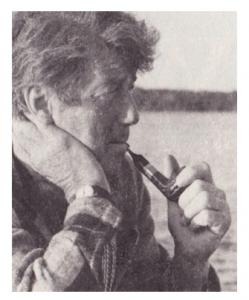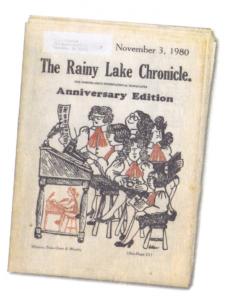Incomparable journalist came home to Rainy Lake, joined Ober’s wilderness crusade
by Diane Rose, Wilderness News Contributor
I didn’t know Ted Hall. But I really wish I had. I have always thought that if I could spend some time with a departed historical figure, it would be Mark Twain – to revel in his unique humor, adventurous spirit and tell-it-like-it-is approach to religion, politics and every other topic under the sun. Ted Hall had all of that, plus a dedication to preserving the natural magic of the boundary waters area surrounding his favorite place in the world: Ranier, Minn., and Rainy Lake.
Edward (Ted) Hall, who died Sept. 23 at age 82, is known for several things. He was an honest, tenacious and gifted reporter and writer who grew up in Frontenac, MN, near Red Wing but quickly moved up to journalism’s big leagues. He worked on a series of New Jersey newspapers, covering stories such as the Attica prison riots in 1969, until he refused an order to kill a story involving a key figure in a sensational murder trial. He was fired, and two days later was hired by Time magazine as a political editor. He also worked as a consultant to NBC Television News. In the early 1970s, tired of the East Coast rat race, he purchased a lobster boat in Boston and sailed with his son Thomas to Duluth, then trucked the boat to Ranier, where he had spent his boyhood summers starting at age 9. In a 1979 interview with the Bergen (NJ) Evening Record, he explained: “It was always in the back of my mind. I wanted to get back to this part of the country, my country.”

Hall also is known as a close friend of conservationist Ernest Oberholtzer, whom he met while growing up in Frontenac. Oberholtzer, who was instrumental in the movement to preserve the Boundary Waters wilderness, hired young Hall to work at Mallard Islands in Rainy Lake during the summers. Although he never took credit for it, Hall later worked to fight commercial development and helped bring the islands under the protection of the Oberholtzer Foundation. They are now known as Ober’s Islands, and Hall loved to spend time there in the summers. He recently was named an emeritus
member of the Oberholtzer Foundation board.
In 1983, Hall wrote the following in a commentary piece for the Minneapolis Star and Tribune about Oberholtzer: “Let us simply note that through all that long battle, Ernest Oberholtzer’s Mallard Island in Rainy Lake was the real headquarters – the touchstone – for the battle, and upon his death in 1977 at the age of 93, friends steered his island home into the foundation he had set up a dozen years earlier to carry on his quiet work as a teacher, friend of wilderness and Indian, friend of art and literature and music and, above all, friend of all people.”
Hall’s sister, Sila Flueger of Red Wing, said her brother’s love of the wilderness stemmed from his friendship with Ober. The Rainy Lake Chronicle made people all over the United States aware of the Boundary Waters area and encouraged many of them to visit, she said. Flueger said Hall often talked about moving to the city but he always felt compelled to return to Rainy Lake. In the mid-1980s Hall and his second wife, Rosalie “Rody” Hall of Minneapolis, sailed the lobster boat down the Mississippi River to New Orleans, where they sold the battered old craft. In 1992, Hall published a book recalling his childhood in Frontenac, titled “Growing With the Grass.” In 1993, while he was living in Minneapolis next to Lake of the Isles, Hall was interviewed by the Rochester Post-Bulletin and said of his home: “It’s partly country. There is some space around.”
In May 1979, Hall wrote an article for Mpls.-St.Paul Magazine called “The Granite, Trees, Blue Sky and Mood of Rainy Lake.” He includes a scathing critique of International Falls, which is “keen on hockey, women’s softball, curling, afternoon girlie shows and both social drinking and unsocial drinking. The approaches to the city from the outer world are adequately stocked with brand-named motels and junk food stands.” He then moves on to a travelogue that covers the town of Ranier, Rainy Lake itself and even Voyageur’s National Park. Hall concludes: “These are the things worth seeing and doing – the bait. All the while, Rainy Lake is working that spell that will bring the visitor back – maybe for good. To repeat the warning: Rainy Lake is more than granite and trees and tall blue sky. It is a mood. It’ll get you – if you’re worth getting.”
Flueger, reminiscing about their childhood, said she and her brother used to go up to Oberholtzer’s place at Rainy Lake the day school was out. “Ted took a lot of canoe trips with Ober,” she said. “That was his favorite time – when he
was out on Rainy Lake and could keep an eye on everything that was going on.” Flueger also recalled how newspapering was in their family’s blood right from the start. Their father had been in the newspaper business and she worked as a society editor at the Red Wing newspaper at one time. “Ted started a little tiny magazine (it was called Old Man River) when he was 7 years old,” she said, laughing. “He made me the printer’s devil; I was only 2 at the time. He was a terrible tease.”
I wish I’d had the chance to spend a day with Ted Hall.
This article appeared in Wilderness News Spring 2004

